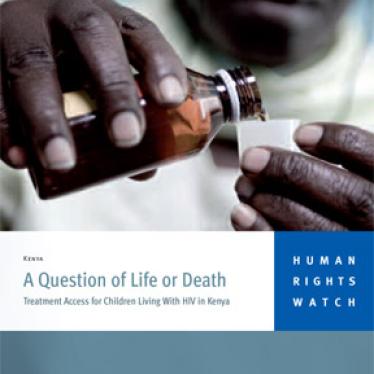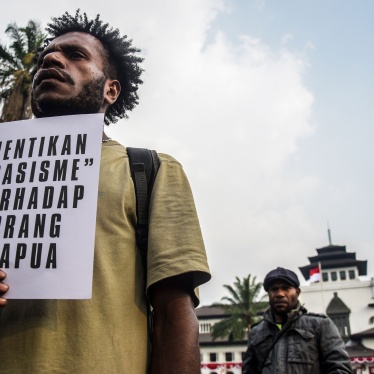The government of Kenya is failing to care for millions of children who have been orphaned by AIDS or whose family members suffer from the disease, Human Rights Watch charged in a report released today.
HIV/AIDS has orphaned about a million children in Kenya and at least 13 million in Africa, and left millions more impoverished and marginalized in many African countries. The disease has also weakened the extended family and other communities to which orphans have traditionally turned.
The report, "In the Shadow of Death: HIV/AIDS and Children's Rights in Kenya," charges that the Kenyan government has failed to take responsibility for children who are at higher risk of human rights abuse when the disease ravages their families. As children are forced to become breadwinners, they are pulled out of school and often forced to take on potentially dangerous labor that is inappropriate for children.
"The rights of children have been the missing piece of the AIDS crisis," said Joanne Csete, researcher in the Children's Rights Division of Human Rights Watch and the author of the report. "If their parents had died in any other way, these children would have been at the top of the agenda. But because the parents died of AIDS, with all of the stigma that implies, they're at the bottom."
Leading Kenyan government officials have not spoken out forcefully enough to reduce the social stigma associated with HIV/AIDS, Human Rights Watch said. It called on President Daniel arap Moi to break the "conspiracy of silence" that has fostered discrimination against children affected by the HIV/AIDS crisis.
Many children are also unable to inherit property to which they are entitled because they are unable to navigate legal processes that are cumbersome and ill-suited to claimants who are minors.
The report focuses on Kenya as an illustrative case of a phenomenon that affects much of Africa. Csete said the government of Kenya had moved aggressively in recent weeks to address HIV/AIDS through better access to drugs and condoms. But she said the government had done little to protect the human rights of children orphaned by the epidemic.
"If families are not there to help these children, then the state has the responsibility to provide protection," said Csete.
Children interviewed by Human Rights Watch said that because of HIV/AIDS, they had to withdraw from school so they could earn money for the family or care for a sick relative, and in some cases to find livelihoods on the street or in domestic labor. Several girls described prostitution as their only way to make a living. Almost all of the orphaned children had faced obstacles to inheriting the house or land to which they were entitled. And many of them did not have good enough information on HIV/AIDS to understand why their parents had suffered and died, and to combat the stigma they faced.
Human Rights Watch called on the Kenyan government to do more to help children to stay in school, and urged the government to make the legal system more accessible to children claiming their property.
Human Rights Watch also urged the Kenyan government to ratify the International Labor Organization convention on hazardous labor for children.







